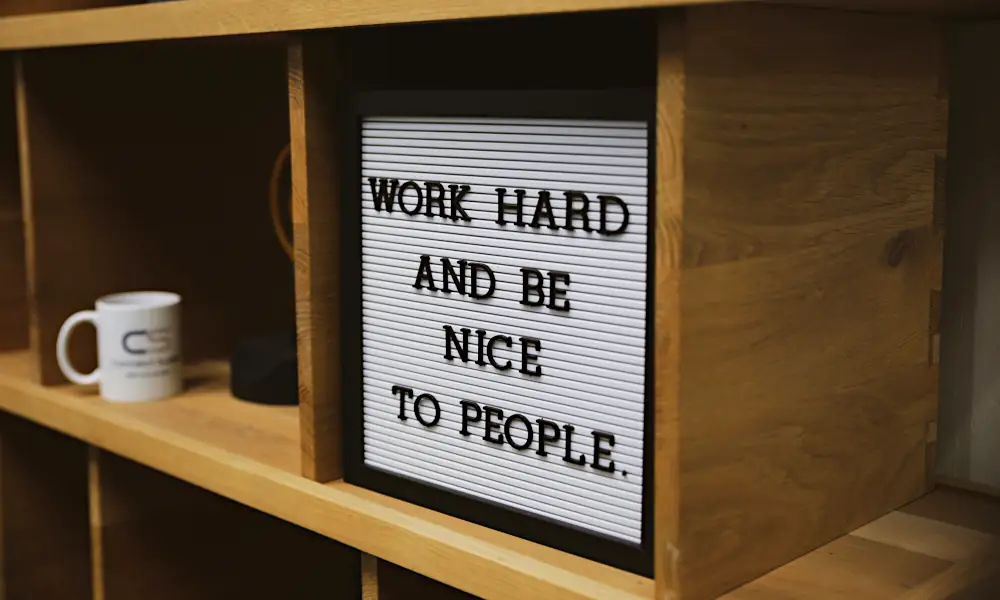Office etiquette is more than just being polite—it sets the tone for a respectful, efficient, and collaborative work environment. Practicing proper office etiquette ensures smooth interpersonal relationships and reflects your professionalism in any workplace setting. Whether you’re navigating shared spaces or sending emails, understanding workplace etiquette helps foster a positive culture and avoid unnecessary friction.
Table of Contents
- What Is Office Etiquette?
- Core Office Etiquette Guidelines
- Tips for Office Etiquette
- Did You Know About Office Etiquette?
- Frequently Asked Questions About Office Etiquette
- What is the difference between office etiquette and workplace etiquette?
- Why is office etiquette important?
- How can I improve my office manners and etiquette?
- What are some common office etiquette rules I should know?
- What are some examples of breakroom etiquette?
- How do I handle office phone calls professionally?
- Are there specific rules for cubicle office etiquette?
- Conclusion
What Is Office Etiquette?
Office etiquette refers to the set of unspoken but widely accepted rules and behaviors that guide professionalism and courtesy in the workplace. These include everything from punctuality and communication to cleanliness and cooperation in shared areas like breakrooms and cubicles.
Understanding office etiquette rules is vital for maintaining a productive and respectful environment. Practicing professional workplace etiquette demonstrates integrity, builds trust, and contributes to a smoother workflow for everyone.
Core Office Etiquette Guidelines
Respect Personal Space
Whether working in open-plan offices or cubicles, always respect your coworkers’ boundaries.
- Avoid leaning over someone’s desk.
- Knock or announce yourself before entering another’s workspace.
- Keep noise levels low—use headphones for music or video calls.
Practice Breakroom Etiquette
The breakroom is a shared space, not a personal kitchen.
- Don’t leave dishes in the sink.
- Clearly label your food and respect others’ belongings.
- If you spill something, clean it immediately.
Communicate Professionally
All communication—written or spoken—should reflect courtesy and clarity.
- Be mindful of tone in emails and chats.
- Avoid using slang or overly casual language in professional exchanges.
- Practice phone etiquette by answering calls promptly and speaking clearly. Read our full guide on Phone Etiquette »
Follow Office Etiquette Rules for Meetings
- Be punctual and prepared.
- Let others finish speaking before responding.
- Avoid side conversations and distractions during virtual or in-person meetings.
Be Aware of Cubicle Office Etiquette
Shared spaces require sensitivity to others.
- Don’t use speakerphone.
- Keep your area clean and organized.
- Avoid loud conversations or personal calls.
Tips for Office Etiquette
Improve your workplace conduct with these practical tips:
- Observe first: Take note of company culture and adapt to it.
- Use neutral greetings: “Good morning” or “Hello” works across teams and roles.
- Respect break times: Avoid interrupting colleagues during lunch or personal time.
- Offer help: If you see someone overwhelmed, lend a hand when appropriate.
- Dress appropriately: Follow the company dress code—even in hybrid or remote roles.
Did You Know About Office Etiquette?
- The term “etiquette” originates from 17th-century France, meaning “a prescribed code of behavior.” Office etiquette has evolved to include everything from email signatures to video call conduct.
- A survey by Accountemps found that more than 80% of managers believe poor workplace etiquette affects employee morale.
- Open office designs increased the need for clear cubicle office etiquette, especially regarding volume and privacy.
Frequently Asked Questions About Office Etiquette
What is the difference between office etiquette and workplace etiquette?
They’re often used interchangeably. However, office etiquette typically refers to behavior in a physical office setting, while workplace etiquette can apply to all work environments, including remote.
Why is office etiquette important?
It promotes respect, prevents misunderstandings, and builds professional relationships. It also helps create a more productive and enjoyable environment.
How can I improve my office manners and etiquette?
Start with basics like punctuality, polite communication, and respecting shared spaces. Observe colleagues and follow company norms.
What are some common office etiquette rules I should know?
- Knock before entering.
- Avoid interrupting.
- Don’t microwave smelly food in the breakroom.
- Keep noise and clutter to a minimum.
What are some examples of breakroom etiquette?
Clean up after yourself, avoid strong-smelling foods, label your items, and refill shared supplies like coffee or napkins if you use the last of them.
How do I handle office phone calls professionally?
Use a polite greeting, speak clearly, and don’t multitask while on the call. Learn more in our Phone Etiquette blog post.
Are there specific rules for cubicle office etiquette?
Yes—keep phone calls brief, avoid loud typing, and respect visual and auditory boundaries.
Conclusion
Practicing good office etiquette benefits not just your personal reputation, but the overall workplace environment. From managing shared spaces to maintaining professionalism in communication, these small actions reflect respect and consideration for those around you.
Explore more tips on respectful conduct in the Workplace Etiquette category to strengthen your professionalism every day.

